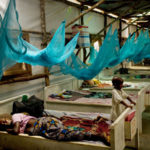
Photo credit: www.doctorswithoutborders.org
Last week, President Koroma of Sierra Leone launched an initiative which promised free health care for pregnant and lactating women in the country. This week, the numbers of women presenting at hospitals have increased ten-fold, stretching the capacity of the health system to provide care. With infant mortality rates that rank the worst in the world, the initiative is a bold one. But despite a $70 million infusion from the UK’s Department for International Development (DFID), many health officials were opposed to the initiative’s launch simply because they didn’t believe they could deliver on the promises. In the words of my colleague who worked for a year in Sierra Leone’s health system, “I have no idea how they’re going to do it.”
After a week, it seems that the naysayers have a point. South Africa’s Independent Online quoted a doctor from the Children’s Hospital in Freetown saying, “Our human resources are also overstretched, drugs have been exhausted and bed facilities are short.” There has been confusion about the initiative, with only government hospitals providing free care and a case where a non-government hospital turned over 100 women away because it was not part of the program.
The initiative brings up a troubling question – when is a bold initiative foolish, and when is it courageous? If Sierra Leone’s boldness leads to systemic reform, in turn leading to improved outcomes for mothers and babies, the initiative will prove worthy. But if promises are not kept, and the initiative poorly implemented, the failed expectations could tip an already-compromised system into an utterly broken one. Mis-aligned incentives could lead to greater corruption (Sierra Leone’s health minister has already been sacked on corruption charges), as well as promote higher pregnancy rates through perception of benefits.
The conundrum is one which tests the hearts and minds of public health workers and politicians alike. For the sake of the women and children of Sierra Leone, let’s hope that the commitment from President Koroma, his international funders, and the doctors currently stretching their shifts to 11 hours or more, does not waver.